What to Feed Nursing Dogs to Produce More Milk?
What to feed nursing dogs to produce more milk? It’s simple, more food and more water. Dehydration will slow down your dog’s milk production quickly but this is a simple problem to solve. You will also want to feed a high-calorie food like wet puppy food, along with extra nutrients.
Having a litter of puppies can be one of the most exciting times for a family. It can also be one of the most stressful times as well (and always a bit of both!). While cute, squirming newborn puppies can bring a smile to almost any face, if their mom doesn’t produce enough milk, everyone, puppies included, can start panicking real fast.
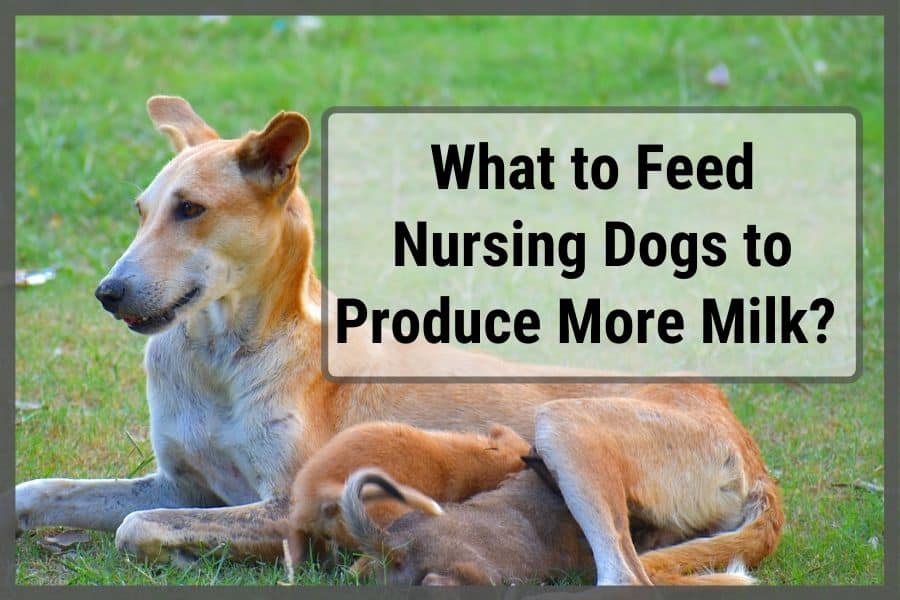
You may wonder why the emphasis on water and how puppy food can help. While there may be other issues affecting lactation that would need a vet’s intervention, these are the two things that most nursing dogs need to produce more milk.
Related Reading: A Brief Guide to the Canine Estrous Cycle
What To Feed A Mother Dog for More Milk
Feeding a mother dog properly can help increase her milk production. Here’s a quick guide to the essentials:
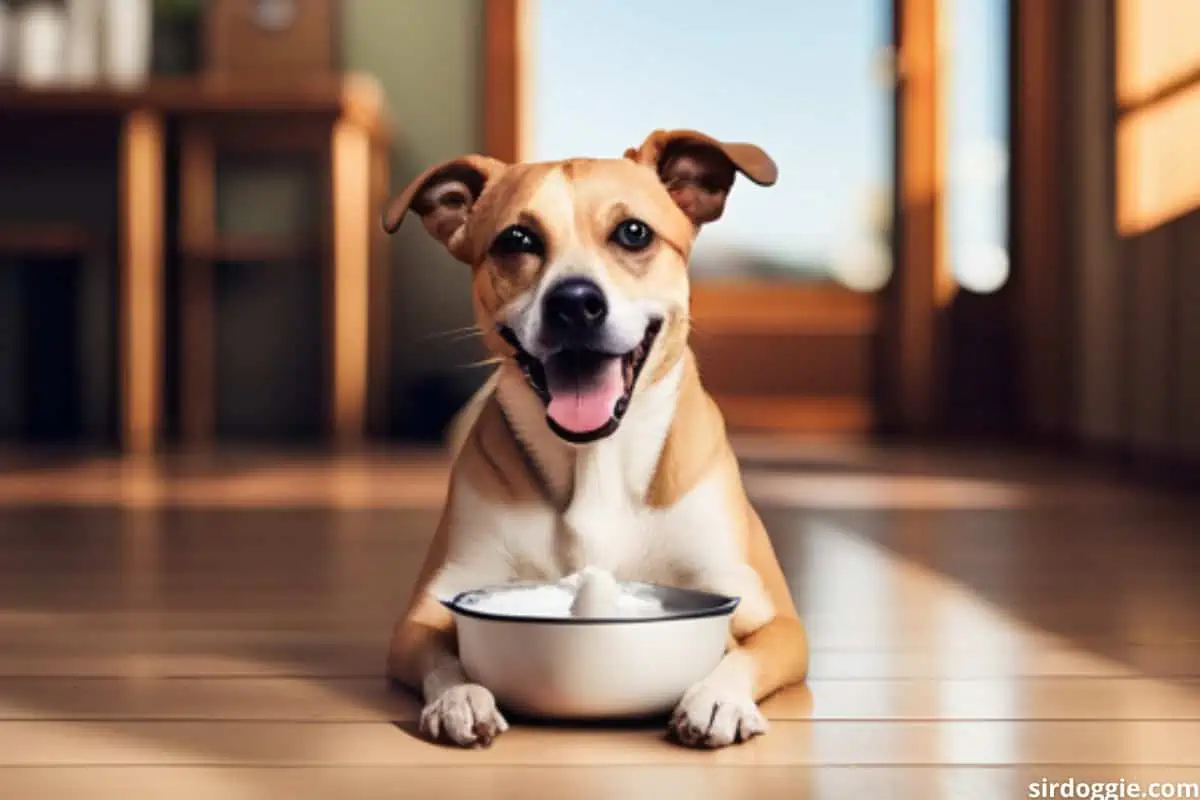
- High-Quality Dog Food: Choose a dog food specifically designed for lactating dogs, usually labeled as “puppy” food due to its high nutrient content.
- Protein: Foods rich in protein, such as lean meats, are beneficial. Consider chicken, turkey, or fish.
- Healthy Fats: Include sources of healthy fats like fish oil or flaxseed, which can enhance the quality of the mother’s milk.
- Calcium-Rich Foods: To support milk production, include calcium-rich foods such as dairy products (in moderation) or bone meal.
- Water: Ensure she has plenty of fresh water available at all times to stay hydrated and support milk production.
- Fruits and Vegetables: These provide essential vitamins and minerals. Consider carrots, peas, and apples, but avoid anything toxic to dogs like grapes and onions.
- Frequent Meals: Feed smaller, more frequent meals instead of large ones to ensure a constant supply of nutrients.
Remember, always consult with your vet before making significant changes to your dog’s diet to ensure her nutritional needs are being met adequately.
Nursing Dogs Need Water for Milk Production and Lots of It!
Water is needed by all mammalian bodies to produce milk, and without it, they can quickly become dehydrated. This is why making sure your nursing dog has enough water should be your first step and priority to help them produce more milk.
Dehydration can very quickly slow down or even stop milk production. Always make sure a nursing dog has a close-by water source[authority link].
If your nursing dog has her litter in a cage, then make sure she has a source of water in the cage with her at all times. Never let it get more than half empty as she may take in a lot when she stops for a drink.
In the first couple of weeks, your nursing dog may have a pup attached almost constantly when she is with them, and this can drain her milk fast.

Some dogs may get picky when they start nursing, but this happens with some humans as well as the hormones for humans and canines can affect them similarly after pregnancy.
So they may decide that they need a special temperature for their water. They may prefer cooler water or a bit above room temperature. You may need to play around with it if she’s not drinking enough.
Water Alternatives for Nursing Dog’s Milk Production
As an alternative, you can offer your nursing dog a few different things to help convince her to drink more. Like humans, dogs like some variety too, and even without puppies and pregnancy, your dog may spend a lot of time teetering on the edge of dehydration on a fairly regular basis.
This can make it hard for her to change her water drinking habits. Consider some of these alternatives to water that will help your nursing dog increase her fluid intake and therefore increase their milk production:

Broth: Whether you go for homemade, canned, or just bullion in warm water, broth, in all of its forms can help a new nursing dog stay hydrated enough to feed her litter, whether it is one squirming bundle of joy or ten. Just don’t get the low sodium kind, the extra salt may help to convince her to drink more as it will make her feel more thirsty (and help her to hang on to more water).
Puppy formula: This one is a little unconventional and on the more expensive side, but it may help a nursing dog get some extra needed calories (especially for larger than normal litters) and help keep her fluid intake up. It also has the bonus of extra nutrients that new nursing dogs need. To make it go a bit further, you can offer it weaker than the directions, as long as she is taking in liquids.
Weak tea: This is especially useful if the new mom has an upset tummy or vomiting. Using tea with milk thistle in it can help with added milk production as this herb is known for it. If you plan to sweeten it, use it sparingly and limit it to natural sweeteners like honey.
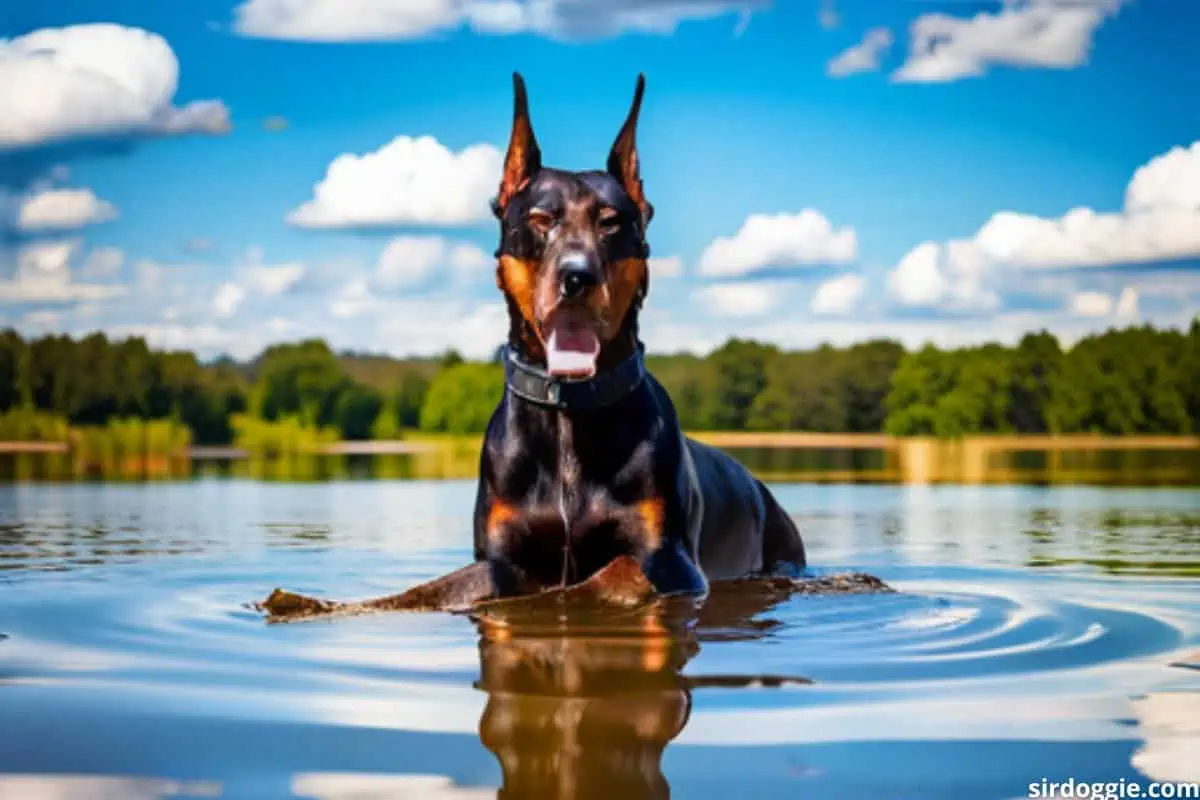
Foods to Help with Nursing Dog’s Milk Production
I like to recommend a two-step process to make sure a nursing dog is getting enough food, calories, and nutrients and is producing the amount of milk her babies need.
Unlimited Supply of Dry Food for Nursing Dog’s Milk Production
Her food should be close, within sight of her puppies, and at all times (at least until they start moving around, eyes are open, and are exploring).
Then it needs to be put out of reach to prevent choking hazards for the pups. Just fill her dish in the morning and make sure it is checked midday and then again before bedtime. If it drops below ½ during the day, refill.
Always top off before bed as she may eat some at night as well. This ensures that she always has enough calories to be able to produce the milk needed for her pups (remember, sometimes a nursing dog is really eating for ten!).
Wet Puppy Food and Nursing Dog’s Milk Production
I recommend treating wet puppy food like you would normally treat her meals. Give her wet puppy food three times a day. This will ensure she is getting a high enough-calorie diet and able to provide the calories her puppies need to grow.
Wet food, in general, tends to have more calories, so this is especially important for smaller nursing dogs. You can check out our post as well, Wet Food vs. Dry Food for a breakdown comparison.
Breeds like Chihuahuas may not have large litters, but their small bodies can be depleted quite quickly. Even a three-pup litter can deplete stored pregnancy resources if not given enough to replace them.
Puppy food not only has extra calories, but it also has extra nutrients to replace those she is giving away in her milk, so she doesn’t get sick trying to feed her brood.
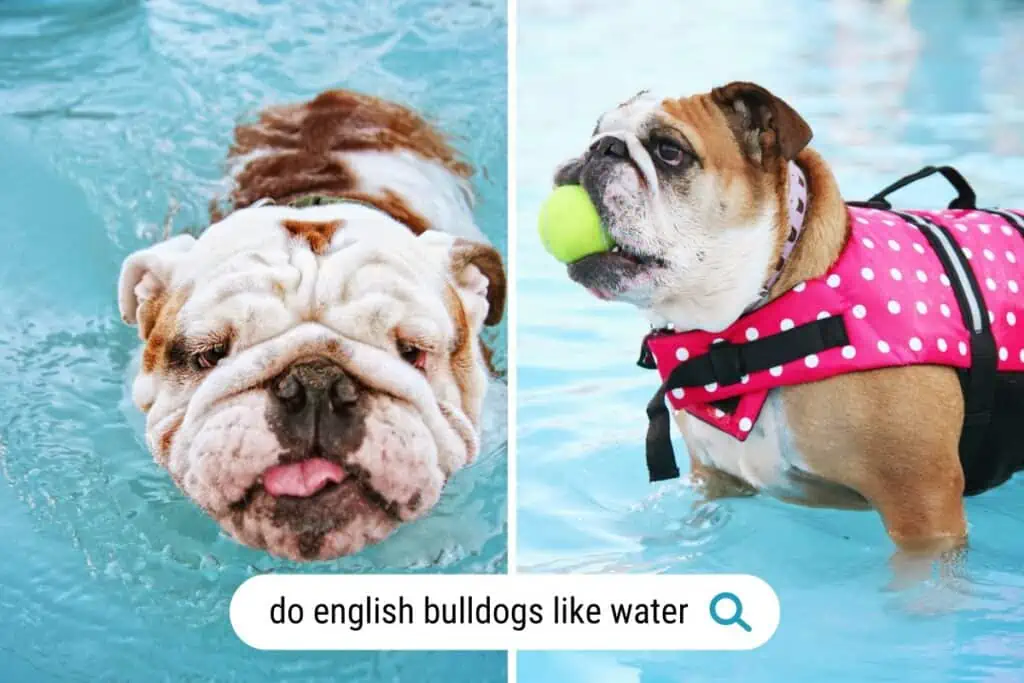
Lack of Lactation For Nursing Dogs – Other Causes
If you notice that your nursing dog is not producing enough milk, if the puppies seem constantly hungry, crying a lot, and nursing but not seeming to get full, don’t wait for it to resolve itself. You may need to have your mom checked out by your vet.
Parasites and Nursing Dog’s Milk Production
If mom is infected by internal parasites, not only will the babies be infected, but it could cause her not to absorb the nutrition she is taking in[authority link]. This will lead to a condition known as malnutrition and will prevent proper lactation.
This is a condition that will need vet intervention to resolve. It WILL NOT go away on its own. It must be treated for mom’s health and that of her litter.
Some parasites can also be transferred to humans, so this is just another reason that she needs to be seen if this is suspected. Eventually, if it is not treated, it will lead to the deaths of both the mother and the pups.
Stress and Nursing Dog’s Milk Production
While this is something that can be treated at home, it should not really be an issue, to begin with, if a nursing dog is being cared for properly.
Taking care of puppies is stressful, and mom does not need humans coming in and bothering her every few minutes. A few times a day should be ok, as long as mom gets more attention than is paid to the puppies.
No matter how loving mom is to her humans, having her litter disturbed can be stressful for her. While it is good that her puppies get used to human scents, it is best if it is mingled with mom’s scent as well.
If mom decides that she wants to show off her puppies to you, she will bring you one or more of them. Then holding them is ok, as long as mom gets attention too.
Other than these tips, mom should be left to rest for the first couple of weeks.
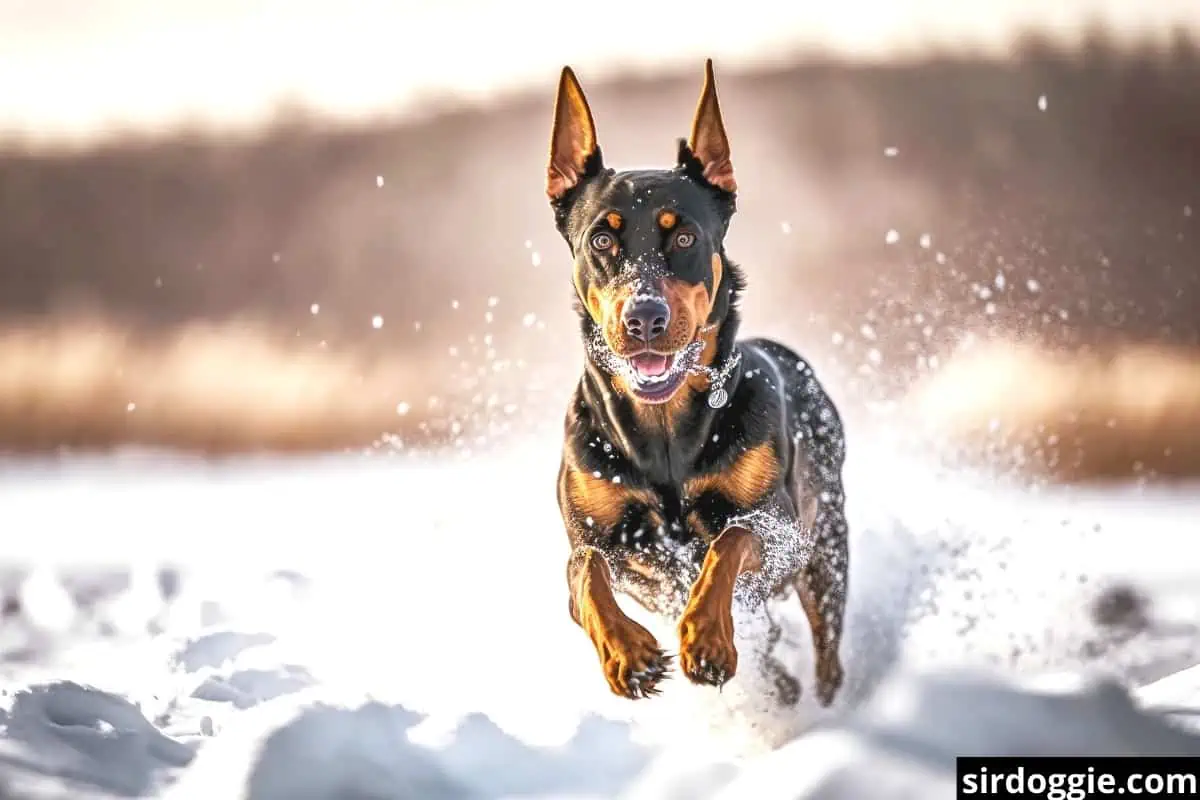
Infection and Nursing Dog’s Milk Production
This is another one that will usually require a vet to diagnose. If you see a pus-like discharge from either mom’s private areas, this requires an immediate trip to the vet for evaluation and treatment, usually with antibiotics.
Keep in mind that puppies need to go with mom so the vet can evaluate them too. Besides, it is usually stressful to be separated from her pups.
Final Thoughts
While this post covered a few possibilities that are serious for nursing dogs, the vast majority of nursing dogs can end up producing more milk by just making sure they have enough water and calories.
Best practice, as always, is to consult your vet if you notice anything off about your dog’s well-being or if you suspect something may be wrong (or to just make sure they’re still doing great!).

Family Dog Expert Author
Hi there! I’m Stuart, a devoted dog lover and family dog expert with over a decade of experience working with our furry companions. My passion for dogs drives me to share my knowledge and expertise, helping families build strong, loving bonds with their four-legged friends. When I’m not writing for SirDoggie, you’ll find me hiking, playing with my beautiful dog, or studying music.